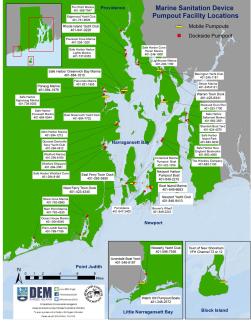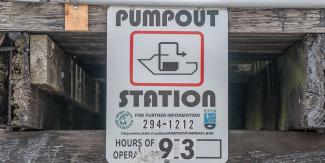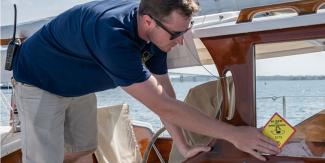Marine Pumpouts: Boat Sewage
Rhode Island No-Discharge Compliance Program
Under state and federal law, it is illegal for boats to discharge any sewage – treated or untreated – into the waters of Rhode Island. These waters include all inland, freshwater bodies in Rhode Island, as well as all marine waters of the state, including all of Narragansett Bay, all of Rhode Island’s salt ponds and estuarine waters, and all coastal waters extending 3 miles from the Rhode Island shoreline (including 3 miles from Block Island). Violators of Rhode Island’s No-Discharge Law are subject to significant penalties. Discharge of greywater, such as water from sinks, is permitted.
Protecting Human Health and the Environment
Prohibiting sewage discharges from boats guards against impacts to human health and the environment. Discharges may degrade water quality and put people at risk by introducing microorganisms, nutrients, and chemical products into the marine environment.
- Microorganisms, which include pathogens and bacteria, may introduce diseases like hepatitis, typhoid fever and gastroenteritis to people who come in in contact with the water, and can contaminate shellfish beds.
- Excess nutrients can stimulate algae blooms, leading to depletion of oxygen in the water. Oxygen depletion (called hypoxia) can stress and sometimes kill fish and other aquatic animals.
- Chemical products can be toxic to aquatic life, and pose risks to human health.
Marine Sanitation Devices (Boat Toilets)
Recreational boats are not required to be equipped with a toilet, but if they are so equipped, the toilet must be a Coast Guard-approved Marine Sanitation Device (MSD), designed either to hold sewage for shore-based disposal or to treat the sewage prior to discharge. There are three types of MSDs.
Type I MSDs treat sewage by chemical means, e.g., maceration and chlorination
Type II MSDs treat sewage by biological means, e.g., bacteria.
Type III MSDs have holding tanks to store treated or untreated sewage and are the most common type of MSD. They are designed to store sewage, usually with disinfectants and deodorants added, until it can be removed at a pumpout facility, and some also have the option to discharge overboard which is only allowed outside state waters (beyond 3 miles from shore).
Vessels up to 65 feet in length may have a Type I, Type II or Type III MSD. Vessels over 65 feet in length must have a Type II or Type III MSD.
Portable toilets or "portapotties" are not considered installed toilets and are not subject to the MSD regulations. They are fine to use and particularly appropriate on small boats. If no other option is available, buckets with secure lids are an alternative. However, they all must be properly emptied at a shoreside facility – never dumped overboard!

When operating or moored in Rhode Island waters (or any other No Discharge Area), all MSDs on all vessels must be properly secured or configured to prevent discharges at all times.
Type III MSDs must be configured to ensure that all waste goes into the holding tank, and none goes overboard. Boats with no ability to discharge, i.e., no through-hull fitting, are fully compliant. On boats that have a through-hull fitting, allowing waste to be discharged overboard, the valve directing the flow of waste must be pointed toward the holding tank and secured in place – by removing the handle, padlocking it, or affixing a non-releasable wire tie.
Type I and Type II MSDS must be secured to prevent use. Closing the seacock and either padlocking it or affixing a non-releasable wire tie, or removing the seacock handle (with the seacock closed) are sufficient. Locking the door to the toilet is another acceptable method.
No Discharge Compliance and Education Program
In 1998 RI became the first state to make all its coastal waters (marine water < 3 miles from shore) a No-Discharge Zone. This is an EPA designation that prohibits the discharge of any sewage from boats/vessels, regardless of treatment. The RIDEM previously had an inspection and decal program to provide visual evidence of compliance with the no-discharge requirements.
Effective January 1, 2025, the inspection and decal requirements of vessels with permanently installed marine toilets were superseded by the distribution of educational materials regarding the proper securing of marine sanitation devices and compliance with R.I. Gen. Laws § 46-12-39 at the time of boater registration.
- List of marine businesses with knowledge of Rhode Island's No Discharge Laws
- Find Pumpout Facilities in:


